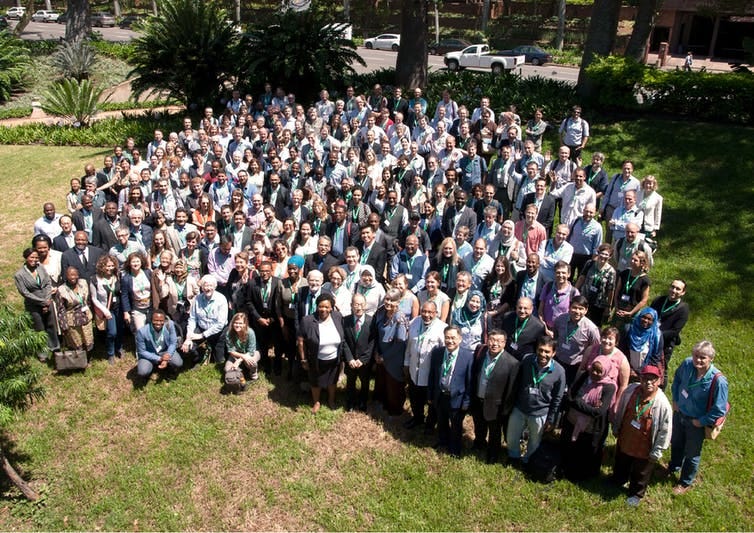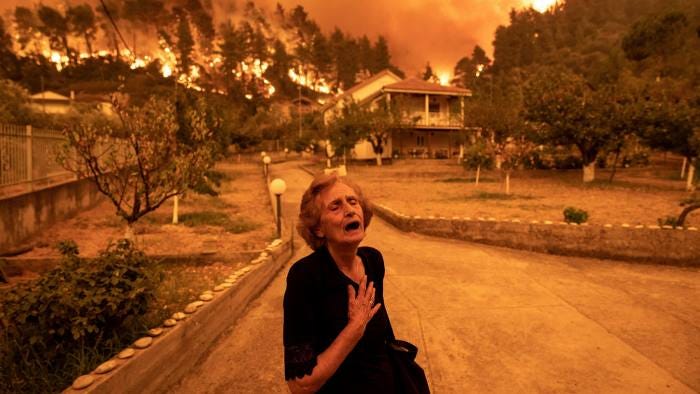The Greek Chorus and Brandolini's Law
4/28/22 – Some Thoughts on the New IPCC Report on Climate Change Mitigation
Hello everyone:
As always, please remember to scroll past the end of the post to read this week’s curated Anthropocene news.
Now on to this week’s writing.
In ancient Greek theater, the chorus served as an interpreter of the action on stage. They spoke directly to the audience, commenting on the action, providing insight into characters’ thoughts, and suggesting through their omniscience how the audience should react. They were masked, anonymous, and spoke as a collective on the drama as it played out.
The Greek chorus we call the IPCC (Intergovernmental Panel on Climate Change) has spoken again, attempting to engage us more deeply as they articulate the unfolding tragedy of climate change. Their words, as always, are fearful in content and beautiful in intent. They are speaking to us in order to save us.
This ongoing production is currently called the Sixth Assessment Report (AR6), years in the making and involving thousands of scientists around the world. As I discussed back in August, U.N. Secretary General António Guterres has referred to AR6 as a “Code Red for humanity.” Last August, the Working Group I report covered the physical science of climate change and explained that the world had only a narrow chance of limiting global heating to 1.5°C. Then in February the Working Group II report revealed in excruciating detail the litany of current and future impacts from our heat and hubris. Then, on April 4th, we received what Guterres called an “atlas of human suffering,” a.k.a. the latest report from Working Group III, “Climate Change 2022: Mitigation of Climate Change.” This third part of the Sixth Assessment Report is the most politically contentious “because it covers the policies, technologies and finances needed to cut greenhouse gas emissions,” according to the Guardian. It’s a measure of where we’re succeeding and failing in terms of slowing emissions and meeting goals or pledges for a vibrant, livable future.
The question, as always, is what we’ll do with the information. And that depends, within my theatrical metaphor here, whether we stay seated as audience members or rise to act. The main actors are those who set or influence policy – governments, corporations, powerful interest groups both good and bad – but we have our roles to play, not least in working together to influence the behavior of the main actors. We begin, though, by accepting these IPCC reports and the data they rely on as gospel.
"Gospel" may seem like an odd word choice here, but while it is associated with faith, gospel is an Old English word meaning “good news,” “good story,” or “good message.” Over the centuries, it became a synonym among the faithful for truth. The IPCC reports may not be filled with good news, but they are essential stories with an essential message for us as we decide the fate of life on Earth.
I'd like to say that we can set faith aside here in order to focus on the truth, the news, the story, and the message, but in the political reality of our time – here in America, at least – we're still hobbled by the fossil fuel industry's decades-long campaign to force the public into a stultifying debate around belief in, or skepticism of, basic observable science.
These epic IPCC accomplishments we call mere "reports" are astonishing in their scientific rigor, their years of effort, their depth of detail, and the breadth of global collaboration which has produced them. In a time of unprecedented crisis, they are to a certain extent the necessary unprecedented response. We should remember, though, that the extraordinary effort is also, to far too large a degree, an effort to counteract the lies of an industry dedicated to private profit over the health of human society and the planet. These executives, board members, and lobbyists are the people I think of when I remember Dorothy Parker’s quip: “Their pooled emotions wouldn’t fill a teaspoon.”
The campaign against climate science is an Earth-shaking example of Brandolini's Law, a.k.a. the “bullshit asymmetry principle,” which is formulated this way: “The amount of energy needed to refute bullshit is an order of magnitude larger than what is needed to produce it.” We’re all familiar with the tension such bullshit produces, which can be fun when the stakes are low. On a good day it’s only a tactic of the comic and the class clown, but on a bad day it’s wielded by the bully, the advertiser, the lobbyist, the bureaucrat, the politician, and the propagandist. At this point in history, we’re deep into a long stretch of bad days. Science is struggling to control the climate and biodiversity narratives, even as the planet’s basic functions are visibly warping around us.
Propaganda is effective when it offers simple lies or sows fundamental doubts in the midst of complicated truths. Science, which often deals with precise estimates rather than absolutes, is an easy victim. Who exactly was around to measure CO2 four million years ago? The Earth’s climate has always fluctuated. Climate scientists are lying so they can profit from our tax dollars. Propaganda becomes extraordinarily effective when deep pockets find shallow politicians, and when one party in a two-party political system uses it to build political capital atop the death of nature. (We can fit many of them in the teaspoon too.)
And so faith in its general sense still plays a role here. We hope that this latest report has its intended effect. We have faith that basic science, properly articulated, will soon sway even the unscrupulous and the suspicious when the data are as clear and alarming as the reality outside our windows. And, to perhaps even a greater degree, we have faith in science and scientists because very few of us even take the time to read the reports.
Some of us, myself included until recent years, don't read them because we're already in the science camp. Our internal monologue is something like We get it, we believe you, the world's on fire, what can we do to fix it? Some don't read the reports, or even know about them, because their lives are circumscribed by stress, suffering, poverty, or limited education. But there is also a fundamental schism between science and society, including the highly educated, that has nothing to do with industrial propaganda or the malfeasance of politicians. The schism is rooted in the scale and inscrutability of scientific knowledge.
How tiny is the proportion of humans who have a comfortable working knowledge across the spectrum of scientific endeavor? Every day I read media stories of breakthroughs in various sophisticated disciplines – quantum physics, geochemistry, brain physiology, etc. – but don’t have the capacity to properly explain the research to someone else. Even the scientists involved in one of these disciplines are unlikely to thrive in another. The essence of the scientific process is that results and findings can be replicated by someone else, but we are most often not that someone else.
This schism deserves an essay or three on its own, but in short I've long found it fascinating that most of us who trust science do so on faith rather than understanding. There’s an irony in this, sure, but it’s a natural one. The edifice of science is too vast, and grows by accretion like a coral reef. (The thousands of papers published every day add their small but solid increments like polyps secreting calcium carbonate.) All we really need, though, to anchor our “faith” in science is a working knowledge of the scientific method. If all parts of society were reasonably well-versed in the scientific method’s basic principles – thoughtful hypothesis, careful observation, systematic testing, and skeptical review – then we would be better defended against the bullshit. The problem, though, is that science is a rational tool devised by an irrational species.
The fossil fuel industry, of course, has long taken advantage of this schism by denigrating the scientific process (even as their own scientists, decades ago, foresaw the upcoming crisis and their responsibility for it). And this leads me to the first specific point about the Mitigation report I want to make for those of you who may not have heard: Even now in 2022, with the world on fire, the industry and its governmental lackeys managed to water down the Summary for Policymakers, which is the version of the report that most readers read. By readers I mean a) the reporters who pass on their understanding to us and b) the policy-makers who make decisions based on what they’ve read. But I also mean c) you, because I recommend that you make the effort to dig into its 64 pages. Or you can charge headlong into the 3000-page full report…
You can download either one here, but you might want to wait for the final clean and glossy version of the Summary to arrive. I haven’t seen a date for that. Currently it’s the final draft form, but it’s really difficult to read because the footnotes are clogging up the text rather than tucked away at the ends of sections. So, for the time being, perhaps it’s best that you find some good explainer articles from sources that are clear on what the chorus is saying. I will try to be one of those, certainly, and will point you to others.
Before I share some of them, though, I’ll tell you what you was watered down or removed from the Summary for Policymakers. (We know about this in part because Scientist Rebellion leaked the report early.) The full report and technical summary were written by scientists. The Summary, though, is edited with input from any U.N. member state which wants to shape the language. You can see how that might be a problem for honest and effective communication in a crisis. It gets worse, though:
Oil company representatives were also included in this process as both authors and editors of the report, which has been the case since the IPCC began. For the latest report, a senior staffer for Saudi Aramco – Saudi Arabia’s state-owned oil and gas company – was one of the two coordinating lead authors, a position of considerable influence, for the chapter on cross-sector perspectives. A longtime Chevron staffer was also the review editor for the chapter on energy systems.
It’s been widely reported that language was removed from the Summary wherever it noted the longstanding obstruction by the fossil fuel industry of climate change progress, and wherever it cited the obvious necessity of strictly reducing fossil fuel production in order to reduce greenhouse gas emissions. Saudi Arabia in particular was eager to shape the Summary to include more language on technical fixes (carbon capture, etc.) and less on reducing production and emissions. For an excellent article on the likely futility of pursuing a carbon capture strategy vs. necessary emission reductions, read this in Mother Jones. Meanwhile, here’s a more blunt statement on the problem with highlighting carbon capture in the Summary:
The [Summary] was mangled by various governments, with an additional 22 pages, mainly presenting carbon capture and storage (CCS) as a form of carbon dioxide removal (CDR) from the atmosphere. Warning against these proposed changes before they came out, Kevin Anderson of the Tyndall Centre for climate research in Manchester said that the report could “pull its punches, hiding behind billions of tonnes of carbon dioxide removal… then the academic community will have abdicated its responsibility and opted for realpolitik over real physics. The climate responds only to the second.”
Also missing from the Summary were any mentions of the impact of population growth as a main driver of climate change. The linked phenomena of population growth and economic growth have been the main drivers of climate change since the dawn of the industrial age. Those discussions have always been part of the IPCC’s assessments, and they are in the current technical summary and full report. This paragraph is in both:
Globally, GDP per capita and population growth remained the strongest drivers of CO2 emissions from fossil fuel combustion in the last decade (robust evidence, high agreement). Trends since 1990 continued in the years 2010 to 2019 with GDP per capita and population growth increasing emissions by 2.3% and 1.2% yr-1, respectively. This growth outpaced the reduction in the use of energy per unit of GDP (-2% yr-1, globally) as well as improvements in the carbon intensity of energy (-0.3%yr-1).
Here’s another example from the technical summary:
The main emissions drivers across the [projected policy scenarios] include growth in population reaching 8.5-9.7 billion by 2050, and an increase in global GDP of 2.7-4.1% per year between 2015 and 2050. Final energy demand in the absence of any new climate policies is projected to grow to around 480 to 750 EJ yr-1 in 2050 (compared to around 390 EJ in 2015) (medium confidence). The highest emissions scenarios in the literature result in global warming of >5°C by 2100, based on assumptions of rapid economic growth and pervasive climate policy failures (high confidence).
All of which means we have a Summary – the document most often read by media and policymakers – which does not emphasize one of the full report’s basic truths: population and economic growth are the fundamental drivers of climate change.
Taking these absences together, it’s worth worrying that policymakers will be even more likely to ignore the question of population, to avoid thinking about the delusion of constant economic growth, and to pretend that the fossil fuel industry can continue producing while we fantasize helplessly about capturing their carbon. The reality is that we need negative population growth, degrowth across global economies, and a hard stop to the majority of fossil fuel production as soon as possible.
Next week I’ll dive into the findings of the WG III report more specifically. There is some good news within its larger tale of caution and concern. Alternative energy sources are ubiquitous and affordable; more governments are making more (and more serious) climate pledges; cities, states, industries, and major organizations are making strides and pushing for more. Most of all, it’s clear that we have every tool we need to rapidly de-carbonize the economy and restore natural systems to improve outcomes in both the climate and biodiversity crises.
All we lack is the political will to turn the ship of civilization in a better direction.
Until next week, then, here are a few excellent sources to read for perspective:
From Carbon Brief, statements from dozens of scientists who contributed to the report on what they thought were important takeaways: https://www.carbonbrief.org/scientists-react-what-are-the-key-new-insights-from-the-ipccs-wg3-report
From the Times, an overview of the WG3 report and a quicker article describing five key takeaways.
From the World Resources Institute, their own analysis and list of six takeaways.
In closing, I’ll note that in Aristotle’s view (from his Poetics), “the chorus too should be regarded as one of the actors; it should be an integral part of the whole, and share in the action.” In this sense too, then, the IPCC’s working groups resemble a Greek chorus. Each scientist may be partly hidden in the crowd of named authors at the top of the report, but their collective voice is also an expression of their individual actions, their careers dedicated to understanding and articulating the tragic unfolding of this Anthropocene climate. We owe them a debt of gratitude for their persistence against the bullshit, the malfeasance, and the inertia. In their depiction of the civilizational theater (all the world’s a stage…) they are modeling for us a way forward.

Thanks for sticking with me.
In curated Anthropocene news:
From the always inspiring Maria Popova of The Marginalian comes a new nine-part animated version of The Universe in Verse, “A celebration of the wonder of reality through stories of science winged with poetry.” These are each short (2 to 4 minutes), but wildly beautiful, collaborations across time with participants such as Patti Smith and David Byrne matched up with the words of sources as varied as Emily Dickinson and Richard Feynman.
From Yale e360, nature-based climate adaptation isn't being funded nearly as much as construction/engineering projects, even though "nature-based adaptation can simultaneously help meet the three great challenges of our time: responding to climate change, protecting biodiversity, and ensuring human well-being."
Six ways of talking about extinction, from The Revelator.
From the Times, California may ban the sale of gas-powered cars by 2035.
From the Guardian, Putin’s war in Ukraine shows, again, the linkage between autocracy and fossil fuels.







